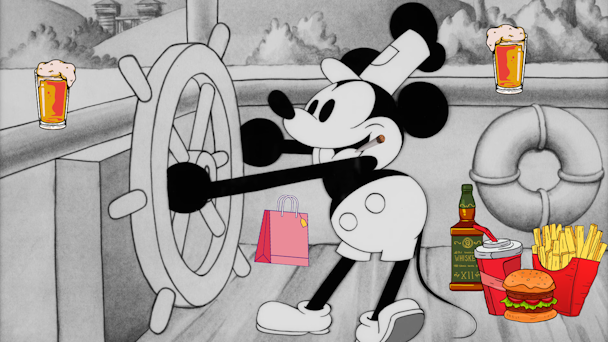Hey creatives – don’t take the Mickey
Yes. Steamboat Willie is now in the public domain. Tread carefully, however, the House of Mouse eagerly anticipates any Mickey infringement, explains Born Licensing’s David Born.

As you read this, creatives worldwide are trying to shoe-horn Mickey Mouse into their latest brief. The new face of that exciting cosmetic brand their agency has just landed. An appearance in the latest creative for their cat food client. Or perhaps an obscure crypto-currency is with certainty ‘going to the moon’ with a new rodent mascot.
It’s just bonged on 2024, and it’s open season on Mickey Mouse now.
Isn’t it?
Well. No. It’s not that simple. In fact, it’s not really that simple at all.
Advertisement
For those who have been having a digital holiday for the first few days of January, let me bring you up to speed. The internet is abuzz with the news of Mickey Mouse’s copyright expiring and the character entering the public domain.
A new movie has been announced, with Mickey Mouse’s Trap claiming the crown of having the first-ever Mickey Mouse horror film despite no one asking for it.
YouTube contains Mickey Mouse video remixes, some with violent and profane outcomes.
Etsy is loaded with shop members selling Steamboat Willy-themed products, from T-shirts to clocks.
Advertisement
Not to mention the first-person shooter game Mouse that allows you to gun down Mickey Mouse-inspired victims.
There is no sign of an adult film yet, but it must be coming.
But if you look closer, you’ll see the important detail. It’s the 1928 Steamboat Willie version of Mickey Mouse that lost its copyright protection on January 1 this year. Not Mickey Mouse as a character.
When thinking of Mickey Mouse, most people think of the character that sports red shorts and yellow shoes. The Steamboat Willie version of Mickey Mouse is black and white.
In fact, in Steamboat Willie, Mickey isn’t even wearing his iconic white gloves. His eyes are different, too, as they’re just two black oval shapes.
Suggested newsletters for you
Disney and other rights holders put great effort into modernizing their characters. There are many reasons for them to do this, such as ensuring their characters remain relevant to audiences and making sure they are amenable to new technology advancements. Another key reason is to keep refreshing their copyright.
Other fictional characters have evolved similarly over time, resulting in the copyright essentially being renewed, including Popeye, Superman and the Pink Panther.
Disney has said that it will continue to protect its rights in the more modern versions of Mickey Mouse and other works that remain subject to copyright. From experience, rights holders tend to address any use of their IP without permission aggressively. Those are calls that no one wants to be on the receiving end of. Trust me.
We would encourage anyone thinking of taking advantage of Mickey’s new copyright status to approach it with care. Seek legal advice to make sure all bases are covered. The last thing you want is for your client to be on the receiving end of litigation from Disney because your creative overstepped the boundaries.
There are complexities to copyright law that need to be deeply considered.
For example, it should also be noted that copyright laws vary by country, so the Steamboat Willie version of Mickey Mouse may remain protected in certain markets.
Unlike the Mickey Mouse seen in Steamboat Willie, this stuff is often not black and white.
Those wanting to incorporate a modern version of Mickey Mouse into their work will still need to follow the same process you would have in 2023. That is contacting Disney and convincing them to let you license the character for your work.
In the unlikely event they can be convinced, of course.
David Born is the CEO of Born Licensing and Born to License. He’s on LinkedIn here.

